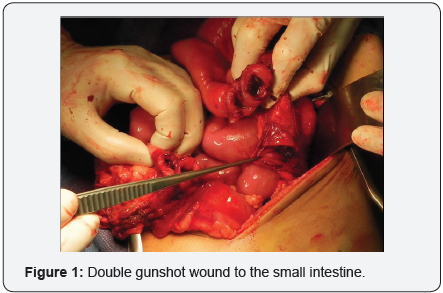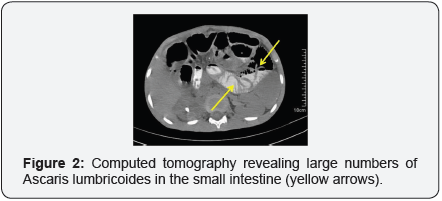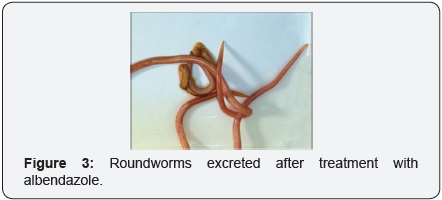Juniper Publishers-Open Access Journal of Case Studies
Post-Surgical Bowel Obstruction Associated with Small-Intestine Ascariasis
Authored by Jiri Paral
Abstract
The case report describes post-operative bowel obstruction after multiple abdominal gun-shot injuries. The ileus was caused by primary unrecognized massively infested intestine with ascarides (Ascaris lumbricoides). 14-year-old boy was wounded during a gunfight. Peri-surgical investigations revealed a double gunshot injury to the small intestine at the interface between the jejunum and the ileum; mesenteric artery bleeding caused haemoperitoneum. The bleeding was stopped, and the injured intestine was treated with direct end-to-end anastomosis using continuous suture. An arrest of gastrointestinal motility occurred during the early post-operative period.
Follow-up computed tomography confirmed that the intestine was infested with ascarides (Ascaris lumbricoides). Administration of oral albendazole (Zentel®) led to gradual excretion of the worms in the stool two days later as well as the restoration of peristalsis. This case is an interesting example of intestinal obstruction that most likely occurred due to small-intestine gunshot injury-associated post-operative paralytic ileus and was significantly potentiated by the presence of parasites in the gastrointestinal tract.
Keywords: Gun-shot, Injury, Bowel, Obstruction, Roundworms, Ascaris
Post-Surgical Bowel Obstruction Associated with Small-Intestine Ascariasis
A 14-year-old Afghan boy was wounded during a gunfight at the outskirts of the Afghan capital Kabul. Since he exhibited the signs and symptoms of a gunshot injury to the abdomen as well as on-setting haemorrhagic shock, the boy was transported by a U.S. Army helicopter to a military hospital at the International NATO military base at the Kabul International Airport. The patient was referred to a Czech field surgical team; after his basic life functions were secured, the patient was transferred to an operating theatre for surgery.
Peri-surgical investigations revealed a double gunshot injury to the small intestine at the interface between the jejunum and the ileum; mesenteric artery bleeding caused haemoperitoneum. The bleeding was stopped, and the injured intestine was treated with direct end-to-end anastomosis using continuous suture. An arrest of gastrointestinal motility occurred during the early post-operative period, which was interpreted as a post-operative paralytic ileus. Prokinetics were administered (syntostigmin), but did not result in the renewal of intestinal motility five days after the surgery.
Follow-up computed tomography confirmed that the intestine was infested with ascarides (Ascaris lumbricoides). Administration of oral albendazole (Zentel®) led to gradual excretion of the worms in the stool two days later as well as the restoration of peristalsis. The patient returned to oral feeding and was discharged 12 days after surgery.
Discussion
This case is an interesting example of intestinal obstruction that most likely occurred due to small-intestine gunshot injury-associated post-operative paralytic ileus and was significantly potentiated by the presence of parasites in the gastrointestinal tract. The human roundworm A. lumbricoides is a 20-30 cm-long worm that occupies the small intestine, where it may survive for 1-2 years. Human ascariasis is an alimentary infection that occurs after the intake of food contaminated with roundworm eggs. Humans are the only vectors. In the intestines, the eggs release maggots that enter the intestinal capillaries and continue to the lungs. They descend to the oesophagus, are swallowed, and reach the intestines again, where they develop into adult roundworms [1].
Although this disease is rather rare in developed, Western countries, the Centers for Disease Control have estimated that up to 1 billion people may be infected [2]. Ascariasis mostly occurs in developing countries with warm and humid climates, poor hygiene, and poor personal hygiene. The disease is frequent in areas where human faeces containing roundworm eggs are used to fertilize the land. Consumption of raw fruits and vegetables facilitates the spread of infection, especially if these foods are handled by an infected individual who does not observe the essential rules of hygiene.
The disease affects people of all ages; its impact on infants and small children is particularly severe and may lead to growth and development disorders [1-3]. The majority of patients with ascariasis have no clinical signs and symptoms. Some patients, especially those with massive infestation, may present with bloody sputum, cough, fever, breathing difficulties, and abdominal pain [3]. Frequently, the worms or their eggs are found in the stool. The worms may also leave the body via the nose or mouth. When the proximal tract is affected, children may vomit the worms. Cases have been described in the literature in which massive infestation with these parasites caused ileus and gastrointestinal bleeding [4-6]. Anthelmintics (e.g. albendazol, mebendazol) are used as the first-line treatment (Figure 1-3) [1,2].






No comments:
Post a Comment